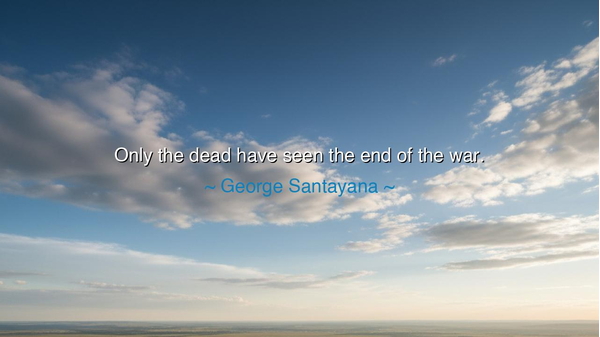
Only the dead have seen the end of the war.






Hear, O children of tomorrow, the grave wisdom of George Santayana, who wrote: “Only the dead have seen the end of the war.” These words carry the weight of centuries, a lament that transcends battles and nations. They reveal a truth the living often forget: though wars may end with treaties and silence may fall upon the battlefield, the struggle of mankind against violence, cruelty, and ambition never truly ceases. The dead alone rest in peace, while the living must walk ever within the shadow of conflict.
The origin of this saying is often mistakenly attributed to Plato, for its resonance feels ancient as the stones of Athens. But it was Santayana, philosopher and poet, who gave voice to this eternal truth in the early 20th century, as the world reeled from the upheavals of modernity and the gathering storm of war. Having seen the cycles of violence repeat themselves, he understood that humanity does not easily escape its appetite for conflict. War is not merely an event—it is a condition of the human heart.
History testifies with countless examples. The First World War was hailed as “the war to end all wars.” Yet within a single generation, the world plunged again into the fires of the Second World War, bloodier and more devastating than the first. Cities like Warsaw, Dresden, and Hiroshima were reduced to ashes, and millions of souls perished. Those who died truly escaped war’s grip; but those who lived bore the scars and the knowledge that peace was only a pause before the next eruption. Thus Santayana’s words rang true: the dead alone see war’s final end.
The ancients, too, bore witness to this cycle. Thucydides wrote of the Peloponnesian War, and how the lust for power led Athens and Sparta into ruin. When one war ended, another began; when one tyrant fell, another rose. The people, yearning for peace, found only brief respite before the wheel turned again. This is the condition Santayana described: that humanity, bound by pride and folly, repeats its conflicts endlessly, and only death grants escape.
Yet within these words there is more than despair. There is also warning and a call to vigilance. If war is an ever-present shadow, then it is the duty of the living to resist it, to hold it at bay as long as possible, and to seek wisdom in the quiet moments between battles. The knowledge that war never fully ends should make us guardians of peace, cherishing every fragile day without bloodshed, and working tirelessly to delay the return of violence. For though we may not end war, we may lessen its reach.
The lesson for us is clear: we must never be lulled into thinking peace is permanent. It must be cultivated, defended, and renewed with every generation. When leaders speak lightly of war, remember Santayana’s truth—that conflict is never truly over, only sleeping. Let us therefore labor to awaken not the beast of war, but the spirit of compassion and understanding. If we cannot banish war forever, we can at least push it farther into the shadows, so that our children may grow without hearing its roar too soon.
Practical action begins in the heart. Resist hatred, for hatred is the seed of conflict. Resist apathy, for apathy allows violence to spread unchecked. Build bridges of fellowship across borders, and support those who strive for justice without the sword. And when conflict arises, let us not glorify it as noble adventure, but recognize it as a tragic necessity to be ended swiftly and wisely. Peace is not given—it is forged by the daily labor of the just.
So let these words echo through the generations: “Only the dead have seen the end of the war.” Take them not as prophecy of doom, but as a summons to vigilance. The dead may rest in eternal peace; but the living must fight, not with swords, but with wisdom, compassion, and courage, to delay war’s return and preserve the fragile gift of peace for as long as the earth endures.






BTLE DANG BAO TRAM
Santayana’s words hit hard. If the dead are the only ones who’ve seen the end of war, does that mean the living will always carry its burdens? Does that also mean we are doomed to repeat history because we never fully learn from it? How do we stop this cycle from continuing endlessly?
RVRoxana Vanx
I’m struck by how this quote suggests a bleak reality—once the living are gone, then, and only then, does war come to an 'end.' It forces me to think: what are we leaving behind for future generations? Are we caught in cycles of conflict that won’t be broken in our lifetime, let alone theirs?
0C05:Huong Chi
This quote feels so grim but also powerful. It implies that the consequences of war are never really over; they just evolve. How do we, as a society, learn to heal and move forward when the effects of conflict never fully disappear? Can we ever truly escape the shadow of war, or is peace always fleeting?
GDGold D.dragon
Santayana’s quote seems to highlight the perpetual nature of war, suggesting that even when battles end, the impact lingers long after. It makes me wonder: does war ever truly end, or does it continue to affect those left behind? What does this quote say about the unresolved scars war leaves on individuals and societies?